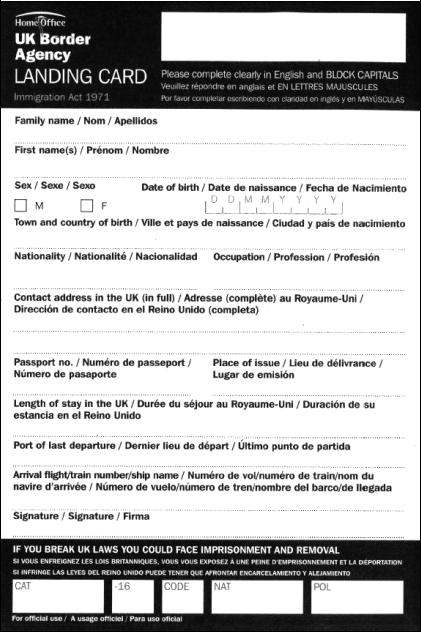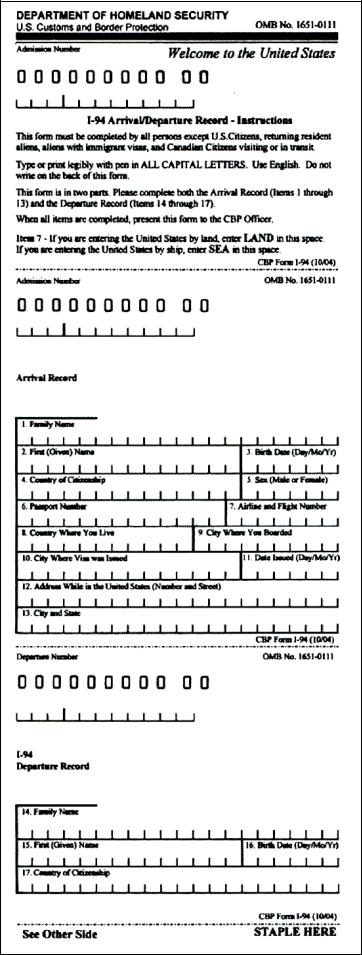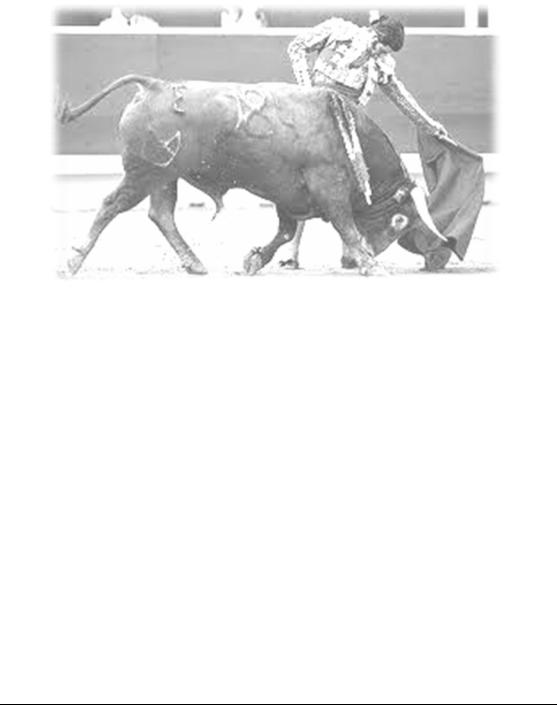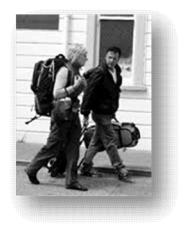
Пособие Борисова (англ для инженеров базовый)
.pdf
59
5.We arrived at the hotel, the Hotel Paradiso it was called, what a joke! They said it was a five-star hotel, but I wouldn’t give it one star! It was just awful. Yes, it was next to the sea, but there wasn’t a beach, just a few rocks, and the sea was so dirty. There were big ships travelling past, and the sea was allpolluted and brown. It lookedhorrible.
6.So we went to look at the swimming-pool, but that was no better. It was a sort of greeny-black colour, and as we looked we saw things that were moving in it. We looked closer and we realized it was full of frogs! There were hundreds of frogs init!
7.We were flying from Gatwick airport, and the flight was overnight, leaving Gatwick late at night and arriving at San Antonio the next morning. But when we arrived at the airport they told us that because of the bad weather in the Caribbean, the flight was delayed until the next morning. So we had to spend the night at the airport, sleeping on the floor, and we finally got onthe plane the next morning twelve hours late.
6.2Can you guess the meaning of the highlighted words from the context?
7. Conversation patterns
7.1Allie is going to the United States. Listen to the conversation at the airport immigration control. Why is she in the US? How long is she planning to stay in the country?
7.2Match the officer’s questions and Allie’s answers.
Officer |
Allie |
Good evening, madam. |
From London. |
How long are you staying in the US? |
In San Francisco, at the Pacific View Hotel. |
Is he family or a friend? |
A week. |
Where are you staying? |
Yes, Mark Ryder. |
What’s the purpose of your visit? |
Good evening. |
Enjoy your stay in San Francisco. |
He’s a colleague – and a friend. |
Where are you arriving from? |
Yes, it is. |
Do you know anybody here? |
Business. I’m here for a conference. |
Is this your first visit to the US? |
Thank you. |
|
|

60
7.3In pairs, roleplay the dialogue. Swap roles.
7.4In pairs, act out a dialogue at immigration.
a.You are going to the UK for a month to study English at the language school called Edwards English School in London. You are going to live in their hall of residence.
b.You are going to spend three months in the USA. You are taking part in the program Work and Travel USA. You are going to stay in the hostel called Tropics in Miami.
8. Writing
Arriving in Britain, you have to fill in a UK landing card. In the USA, there is a special Arival/Departure Record. Look at the samples and say what information you have to write about. Practise filling in both cards.

61
62
OVER TO YOU:
1.Can you describe the best holiday in your life?
2.Can you describe an interesting / unusual event from your past?
3.Can you describe your ideal holiday?

63
Module 8
IT’S A SMALL WORLD
Who do you think these myths are about? Do you think these myths are true?
Theydrink tea everydayat five o’clock.
They enjoybullfighting.
Theyare verykeen on fast food.
Theyeat pasta everyday.
Theykeep bears as pets.
1. Pronunciation and vocabulary
Practise saying the names of the countries. Complete the chart with nationalities and languages. Listen and check.
|
Country |
Nationality |
Language |
|
|
|
|
|
The United |
The British |
English |
|
Kingdom |
|
|
|
|
|
|
|
Spain |
|
|
|
|
|
|
|
Japan |
|
|
|
|
|
|
|
Brazil |
|
|
|
|
|
|
|
Italy |
|
|
|
|
|
|
2. Reading and vocabulary |
|
|
|
2.1 Read the article. What does it say about national stereotypes?
Are we typical?
The English are cold and reserved, Brazilians are lively and fun-loving, and the Japanese are shy and hardworking – this is what peopleusually think about these nationalities.
How much truth is there in national stereotypes? Two scientists, Robert McCrae and Antonio Terraciano, investigated the subject, and the result was surprising.

64
The scientists tested people of 49 different nationalities. Then, they interviewed them and asked them to describe a typical member of their society. The analysis showed that the stereotype was very different fromthe reality.
For example, Italians and Russians think of themselves as sociable and open, but the tests show they are more reserved. The Spanish see themselves lazy, but in fact they are very hardworking. The English are the most open-minded nationality, which is very far from the stereotype!
The tests also showed that all nationalities don’t have many differences. Infact,we have a lot in common!
2.2In the text, find the words describing character.
2.3Complete the sentences with the personality adjectives.
hardworking open-minded lazy reserved sociable hospitable shy fun-loving practical reliable talkative organized moody
a.______ people who are open and enjoy the company of other people
b.______ people who are happy one minute and sad the next minute
c.______ people who like chatting
d.______ people who like to work
e.______ people who don’t like to show their feelings
f.______ people who can be self-disciplined
g.______ people who don’t like to work
h.______ people who like visitors
i.______ people who are not confident in themselves
j.______ people who know how to spend their money
k.______ people you can trust or believe
l.______ people who love parties
m.______ people who are open to new ideas
2.4 What kind of person are you? Describe yourself in three words. Are you a typical representative of your nationality?
3. Speaking and vocabulary
3.1 Match the geographical words from the box with their definitions. Listen and repeat.
island population scenery climate beach mountain volcano desert glacier border river lake taiga coastline canal

65
a. an area of water surrounded by land
b. a very dry place where there is very little rain c. the dividing line between countries
d. an area of land surrounded by water e. all the people living in a country
f. the type of weather characteristic for a particular area g. a man-made river
h. a stream of water flowing into another stream or a sea i. a view, natural features of an area
j. the line where sea and land meet
k. the type of forest where conifer trees mostly grow l. a large mass of ice
m. a large landform usually higher than the surrounding areas
n. an opening in the planet’s crust which allows magma go to the surface o. a part of a coastline where you can go sunbathing
3.2 |
What do you know about New Zealand? Can you answer the questions? |
||
|
a. Which is the nearest country: Australia or the Philippines? |
||
|
b. How many islands are there? |
|
|
|
c. |
Which country is as big as New Zealand? |
|
|
d. |
How large is the population? |
|
|
e. |
What are the two official languages? |
|
|
f. |
What film made New Zealand popular for tourists? |
|
|
g. Which part of New Zealand has a colder climate? |
||
|
h. What kind of scenery can you find there? |
||
3.3 |
Listen and check. Which words from 3.1 can you hear? Listen again and check. |
||
3.4 |
Speak about New Zealand. Use the phrases from the box. |
||
|
|
||
It’s inthe south/ north/ east / west of… |
It’s the highest / biggest / nearest … |
||
It’s famous for … It’s a goodplace for… |
People think that… It has fantastic… |
||
|
|
||
3.5 |
How well do you know your country? Make questions, then listen, check and |
||
repeat. Answer the questions.
Climate
What’s / cold/ place?
What’s / hot / place?
66
|
Tourism |
|
|
|
|
|
|
What’s / beautiful / city? |
|
|
|
|
|
|
What’s /popular place for tourists? Why? |
|
|
|
|
|
|
|
|
|
Geography |
|
|
|
What’s / good/ time of the year to visit? |
|
|
|
|
|
|
|
|
|
What’s / high/ mountain? |
|
|
|
What’s / bad / time to visit? Why? |
|
|
|
|
|
|
|
|
|
What’s / long / river? |
|
|
|
What’s / good/ way to travel roundthe |
|
|
|
|
|
|
|
|
|
What’s / big / city? |
|
|
|
country? |
|
|
|
|
|
|
|
|
|
|
|
|
|
What’s / dangerous / region? Why? |
|
|
|
|
|
|
|
|
|
|
|
|
4. Grammar
4.1 Complete the chart with the forms of adjectives.
adjective |
comparative |
superlative |
|
|
|
cold |
colder |
coldest |
|
|
|
high |
|
|
|
|
|
hot |
hotter |
|
|
|
|
dangerous |
|
|
|
|
|
dry |
|
driest |
|
|
|
windy |
|
|
|
|
|
good |
better |
|
|
|
|
bad |
|
worst |
|
|
|
4.2Complete the sentences with a form of an adjective.
a.Driving is (dangerous) than flying.
b.This is the (famous) building in the city.
c.Chinese is one of the (difficult) languages to learn.
d.Canada is (big) than Brazil.
e.This is the (populated) region of the country.
f.French wine is (good) than English wine.
g.It’s the (hot) place in the world.
h.Buses are (cheap) than trains.

67
4.3 Listen to the dialogue between Sarah and Daniel. Choose the correct answer.
a.Sarah has been to Venice.
b.Sarah has been to New York.
Listen and repeat. Copy the rhythm. Write down the conversation.
Act out a similar conversation about the places you have been to.
4.4 Talk to the people in the class. Find a person who…
a.has been to another continent
b.has been to an opera
c.has been to a big sport event
d.has been to a big rock / pop concert
e.has ever sung karaoke in a bar
f.has ever spoken English with a person from another country
g.has ever been to a spa
h.has ever ridden a horse
i.has ever jumped with a parachute
j.has never smoked
k.has never been outside this city
l.has never heard of Christian Ronaldo
m.has never played basketball
Work in small groups. Sum up the information you have collected. Tell the class what you know.
4.5 Listen to five people talking about something they have/haven’t done so far. What period of time is each of them talking about?
a.all his life / this week
b.this week / this year
c.all his life / this month
d.today / this year
e.this year / all her life
Now, say what exactly they have / haven’t done so far.
4.6 Listen to ten questions and write down your answers.
Look at your answers and try to remember what the questions were. Practise asking and answering them with a partner.

68
5. Reading
5.1 Read the text about Russian traditions and match the traditions with the events. Which of these traditions are more common and which are less common?
1. This is the biggest and most favourite celebration for Russians. It is the belief that the way you celebrate this event shows how your year will be, so Russians prepare the best meals and celebrate in style. Duck or goose, stuffed carp, and a jellied meat called 'holodets' are among the common most dishes, as are small pies/pastries filled with cabbage, apple, meat, or a range of other fillings. On the morning of January 1, people usually don’t cook and eat the leftovers.
2. The main tradition at this time is the painting of hard-boiled eggs. Red is the predominant colour, as it signifies new life. Russians exchange eggs and kindwishes for the celebration.
3. It is tradition for the father to plant a tree, wishing the child to grow upstrong andhealthy just like the tree.
4. The husband must carry his wife over the threshold in his arms. It is a very old custom and began because people thought that a new wife would be wanted by evil spirits, and thus the husband should holdher tightly and protect her fromthem.
5. Before departing on a long trip, Russian people often sit in silence for a few minutes, praying for good luck and fortune during the journey.
6. At the beginning of spring, as the weather warms, and the days become brighter, children and young adults often play outside. They play different Russian games, they play with the snow, and often fall in love. At this time, Russians also celebrate pancake because a pancake is round like the sun, and it symbolises the new life beginning inspringtime.
7. It is a custom for the certain person to organize a celebration, and this includes paying for dinner if it takes place in a restaurant. The celebration can sometimes go on for more than one day. A playful form of congratulations to the person in question is to pull their ears for the number of years they are! It is a playful joke, but it means that we wishthem a long andhappy life.
